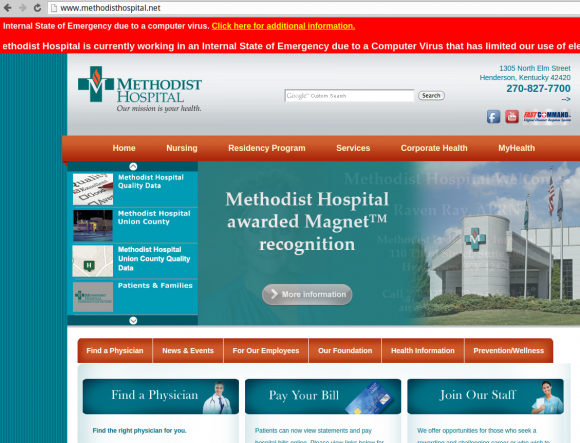Hospital Declares ‘Internal State of Emergency’ After Ransomware Infection
Bangladesh central bank weighs lawsuit against NY Fed over cyber heist
March 22, 2016Yahoo to suspend Daily Fantasy Sports in New York
March 22, 2016A Kentucky hospital says it is operating in an “internal state of emergency” after a ransomware attack rattled around inside its networks, encrypting files on computer systems and holding the data on them hostage unless and until the hospital pays up.

A streaming red banner on Methodisthospital.net warns that a computer virus infection has limited the hospital’s use of electronic web-based services. Click to enlarge.
Henderson, Ky.-based Methodist Hospital placed a scrolling red alert on its homepage this week, stating that “Methodist Hospital is currently working in an Internal State of Emergency due to a Computer Virus that has limited our use of electronic web based services. We are currently working to resolve this issue, until then we will have limited access to web based services and electronic communications.”
Jamie Reid, information systems director at the hospital, said malware involved is known as the “Locky” strain of ransomware, a contagion that encrypts all of the important files, documents and images on an infected host, and then deletes the originals. Victims can regain access to their files only by paying the ransom, or by restoring from a backup that is hopefully not on a network which is freely accessible to the compromised computer.
In the case of Methodist Hospital, the ransomware tried to spread from the initial infection to the entire internal network, and succeeded in compromising several other systems, Reid said. That prompted the hospital to shut down all of the hospital’s desktop computers, bringing systems back online one by one only after scanning each for signs of the infection.
“We have a pretty robust emergency response system that we developed quite a few years ago, and it struck us that as everyone’s talking about the computer problem at the hospital maybe we ought to just treat this like a tornado hit, because we essentially shut our system down and reopened on a computer-by-computer basis,” said David Park, an attorney for the Kentucky healthcare center.
The attackers are demanding a mere four bitcoins in exchange for a key to unlock the encrypted files; that’s a little more than USD $1,600 at today’s exchange rate.
Park said the administration hasn’t rule out paying the ransom.
“We haven’t yet made decision on that, we’re working through the process,” with the FBI, he said. “I think it’s our position that we’re not going to pay it unless we absolutely have to.”
The attack on Methodist comes just weeks after it was revealed that a California hospital that was similarly besieged with ransomware paid a $17,000 ransom to get its files back.
Park said the main effect of the infection has been downtime, which forced the hospital to process everything by hand on paper. He declined to say which systems were infected, but said no patient data was impacted.
“We ave downtime procedures to going to paper system anyway, so we went to that paper system, he said. “But we don’t feel like it negatively impacted patient care. They didn’t get any patient information ”
Ransomware infections are largely opportunistic attacks that mainly prey on people who browse the Web with outdated Web browsers and/or browser plugins like Java and Adobe Flash and Reader. Most ransomware attacks take advantage of exploit kits, malicious code that when stitched into a hacked site probe visiting browsers for the the presence of these vulnerabilities.
The attack on Methodist Hospital was another form of opportunistic attack that came in via spam email, in messages stating something about invoices and that recipients needed to open an attached (booby-trapped) file.
It’s a fair bet that as ransomware attacks and attackers mature, these schemes will slowly become more targeted. I also worry that these more deliberate attackers will take a bit more time to discern how much the data they’ve encrypted is really worth, and precisely how much the victim might be willing to pay to get it back.
Tags: David Park, Jamie Reid, locky ransomware, Methodist Hospital
This entry was posted on Tuesday, March 22nd, 2016 at 1:52 pm and is filed under A Little Sunshine, Data Breaches. You can follow any comments to this entry through the RSS 2.0 feed. You can skip to the end and leave a comment. Pinging is currently not allowed.

